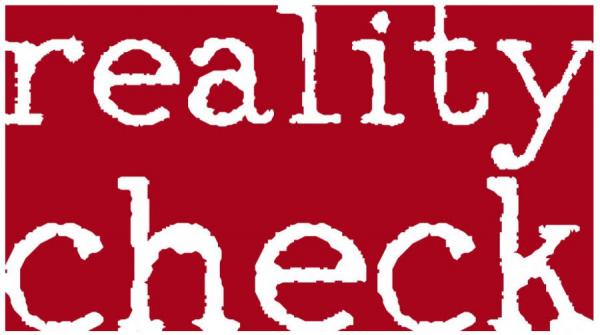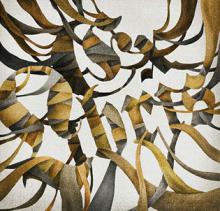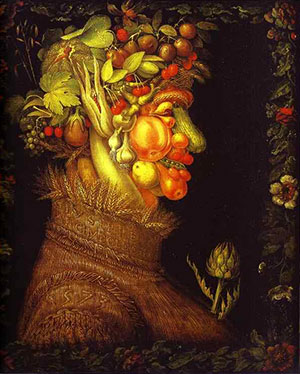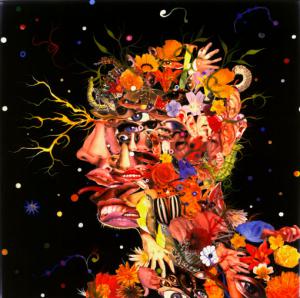Serendip is an independent site partnering with faculty at multiple colleges and universities around the world. Happy exploring!
Towards Day 4: Reality Check


discussion notes by ckosarek
I. coursekeeping
sign in
getting to know one another, day 4:
look around and ask for the names you don't know...
moving house (to where we can hear!):
on Tuesday--and thereafter--we'll meet in II
verifying that everyone's signed up to take notes
for two classes?? these should go in the course forum
(cf. Cassie's great report on Tuesday's class:
needs editing to accord w/ policy of not using real names....)
how we doing on the Serendip front?
(no postings yet from amanda, audrey?
platano's html is showing;
tgarber's in the wrong spot....)
for Tuesday,
read as much of Bechdel's graphic narrative,
Fun Home, as you can manage...
(we'll take a week w/ this, so plan to finish it by Thursday)
using it as an example (is it one?) of the genre of non-fiction:
what are its (fictional? factual? realistic? "real") qualities?
what can you say about its form?
who has read it before, in what context?
what were the motivating questions in those contexts?
(come prepared to tell us/preferably post what you know already....)
reminder that your first essay is due on-line
a week from tomorrow, and that you need to come see me
when you have an idea formed (but not too formed)
one of my (many) agenda items in this course is to get you to re-think what you think about (and how you yourself write) the particular form of non-fictional prose that is the academic essay
You've already gotten lotsa (good?)
advice from David Shields:
"'Essay' is a verb...'essaying' is a process" (#386).
"Essay: theater of the brain" (#387).
"In essays, ideas are the protagonists" (#388).
"Nonfiction...is...a very flexible (easily breakable) frame that allows you to pull the thing away from narrative and toward contemplation" (#371).
"The lyric essay is the literary form that gives the writer the best opportunity for rigorous investigation, because its theater is the world (the mind contemplating the world) and offers no consoling dream-world, no exit door" (#107).
"develop a dialogue between parts of yourself .... Ambitious work doesn't resolve contradictions ... but instead embodies contradictions" (#406-407).
[the whole "p" & "q" sections, on
"doubt" and "thinking," pp. 138ff!]
questions about any coursekeeping stuff?
II. back to our hunger for reality....
Aya: his suggestion? Seems to be: it's all old, so it's all everyone's? But he's not entirely correct. And that's patently obvious in the hunger that actual waits under neath his text....
looking again for a moment @ the history of the visual collage...
|
|
|
what is like/different about these two images?
anything instructive there re: our conversation on
Tuesday re: the possibility of newness?
on using images to construct arguments
(can you argue w/ an image??)
what seemed important to me (checking in w/ Cassie?) was
naming the form of collage as "fucking w/ the familiar,"
"destroying absolute authority along w/ the pretence of originality"
1) challenging our (educated) assumptions about how to read--
Aya: this could have been a very personal admittance. of words he love and loves loving. I don't think that's what has been done here, but there's possibility, in this form, of altering anthologies. of opening up the intertextual.
smacholdt: I think that humans by nature like patters, and it was basically impossible to find any sort of pattern or coherence in Reality Hunger.... I get enough reality every second of the day...without opening a book.
EVD: if I read the book as a long sequence (like I might read a novel) rather than just as a bunch of quotes, then I don't skip over things that seem less interesting, I pay attention...
2) challenging our ideas about ownership of language and ideas --
Kate: Who owns reality? Who owns the words?
appendix: Your uncertainty about whose words you've just read is not a bug but a feature.
Mark Lord: "intellectual property is an oxymoron" --
RiP! A Remix Manifesto. Dir. Brett Gaylor. Prod. Sodec Quebec. Web. Film. 21 Feb. 2010:
http://www.hulu.com/watch/88782/rip-a-remix-manifesto
3) and challenging our predilection for the nostalgia
(and illusory coherence) of "novelly novels" (in part by deliberate unartiness, randomness, serendipity, REPETITION--life repeats!)
the alternative is problematic
(how do artists get paid? how does work get recognized?)
but the challenge is an important one:
stop policing who "owns" ideas, in order to
get a-holt of the REAL, not just representations
#166: "anything processed by memory is fiction"
maht91: It is frustrating to think about the relationship between memory and truth because it made me doubt the real aspects of books that I previously read.
once you challenge any sharp division between fact and fiction
(#184: "'Fiction/"nonfiction' is an utterly useless distinction")
what IS the real?
postmodernism: there isn't any...it's all performance,
all construction (but real houses are constructed....)
#287: "Reality is what is imposed on you; realness is what you impose back. Reality is something you could question; realness is beyond all doubt."
is reality certain? important to you all? in what contexts?
(platano on the teenage game of "realness")
try exercise we didn't get to on Tuesday: go 'round: everyone read two passages that caught their attention (don't worry about repeating: t'would be interesting if there were some repetition)
were we most struck by the emphasis on "realness," or by other claims? what is Shields' saying? what are we saying? what's the difference?
which of these images (or which other....)
best figures what you "saw" in Shields' book?
 |
 |
 |
(books woven into beautiful forms, flying apart, being burned...?)
what is the present--and future--of literature, as he describes it?
(my reading notes)
k) reality tv
unfiltered: anything can happen
lust for emotional meaning: thirst for others' reality
l) collage
chaotic, opaque operations of the mind:
no internal spectator of a Cartesian theater in our heads
collage's parts competing for a place in some unfinished scene
absence of plot: room to think
collage: an evolution beyond narrative
in montage: meaning created by juxtaposition/relationship of images
found objects abolish separate between art and life
collage is accentuated editing
writing stripped of originality:
mediation, selection, contextualization, reading practice
harvest the random elements that the process throws up
m) in praise of brevity
short-short: only highlights, no downtime
style: greatest # of ideas in fewest words
omission=creation
novel: overbuilt stage set
bored when written out, no shorthand
n) genre
lyric essay: myth of objectivity less possible now
making knowledge: a large and unstable thing
memoir as nonpoetry: find truth w/in experience
o) contradiction
"This sentence is a lie."
negative capability: capable of being in uncertainties...
w/out any irritable reaching after fact
the mind works by contradiction
p) doubt
authenticity: faithfulness to ambiguity of experience
essay a conditional form: less a genre than an attitude; enacts doubt
q) thinking
great book: deep conversation w/ another consciousness
How can I tell what I think until I see what I say?
I write entirely to find out what I'm thinking
his thoughts and how he came by them; trying to get somewhere
telling a story: resolving a thought
essay: philosophical investigation; no ideas but in things
bibliographies (throughout)
looking for company: reminder we're not alone
in nonfiction, thinner mediation between writer and reader; masks removed
r) autobio
most writers make a map=picture of themselves
only serious journey into the self, never fully known
To what degree can solipsism gain access to the world?
no history, only biography; highest/lowest form of criticism
s) persona
personal essay behind stylized version of selves; clever subterfuge
What makes humans human: they don't know the future.
confessional vs. universal; life a continual allegory
all stories the same; every man w/in self the entire human condition
t) ds
art: life turned sideways
deepest plot in Proust: uncovering process by which it came into being
way my mind thinks--everything connected to
everything else--transportable to writing
bored by out-and-out fabrication
artistic process: transform insight into metaphor, make it ramify to hold everything
documentary frame promises news of the world
no difference along the truth continuum
u) alone
democracy throws man back on himself
essence of life: how we handle our loneliness
no objectivity, but must deny subjectivity: lose to find self
life discreteness, separation, death divestment, communion
v) it is much more important to be oneself than anything else
cultivate what critics don't like about your work: individual, worth keeping
life more successfully looked @ from a single window
contemporary experience always secondhand
w) risk
not instruction but provocation received from other souls
hellish, accursed artistic dallying w/ forms
x) let me tell you what your book is about
endless American dilemma: dream of self v. dream of community
different fictions maintain order (marriage, drink, law, money, the web)
lay self open as historical text
endless not getting what you want
Seattle: conventional ambition foresworn
push all books toward abstraction, doubleness, allegory
communication alone will save us
y) manifesto
evaluate artists by how much they are able to rid selves of convention
contemporary literary prizes: federal bailout package?
work of art not ready-made but living form
urgency of tale taken directly from life (vs. never-never land of imagination)
life lived on high alert
deforming medium to say what has never been said
contrivance, nostalgia of novel
self-knowledge in non-fiction: less indirect, more open, speculative
personal essay: basic research on self (science, philosophy)
poem, essay urgent attempts to solve problems; fiction entertains (bores)
lyric essay oxymoron, killed itself
never again: single story told as though the only one
z) coda
the banditry of documentary: loot someone else's life
appendix
feature, not bug: uncertainty re: whose words
focus of appropriation, plagiarism
we all own the words: reality cannot be copyrighted




